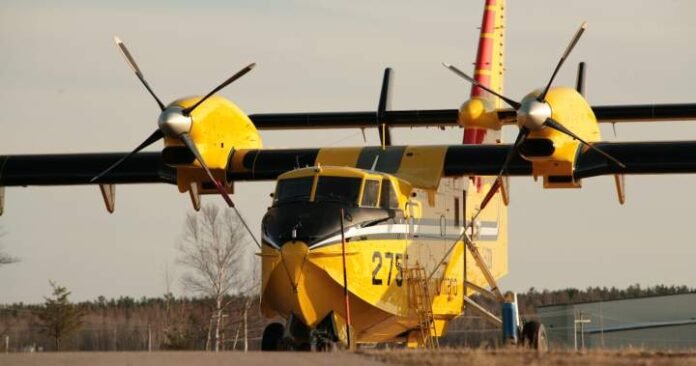Premier Doug Ford has acknowledged that his province has a shortage of pilots trained in the difficult task of flying water bombers over forest fires, as blazes continue to rage across northern Ontario.
Earlier in the season, the union representing front-line firefighters said planes in the province were grounded because Ontario didn’t have enough pilots to fly the water bombers it currently owns.
It’s a claim the Ministry of Natural Resources confirmed to Global News, although it did not say exactly how many planes are grounded or how often.
On Tuesday, at a meeting of the nation’s leaders in Muskoka, Ont., Ford said there were pilots in the province, but suggested they don’t have the training to fight fires.
“We have lots of pilots, but you have to also understand you can’t just have any pilot with these water bombers,” he said.
“And then we have the helicopters, too, that carry an enormous amount of water as well. So I think it’s all hands on deck as well.”
The Ford government has said it is ordering new water bombers, but the premier complained they take up to four years to build.
Ford, as the chair of the Council of the Federation, is leading a push from the country’s premiers to have the federal government take on a bigger role in fighting fires.
“What happens every single year, and we know what’s going to happen, there’s wildfires right across the country,” Ford added on Tuesday.
“We need a national program that we can call on for resources.”

Get daily National news
Get the day’s top news, political, economic, and current affairs headlines, delivered to your inbox once a day.
That request is being floated for the first time this year during a potentially record-breaking summer for the country, where more than five million hectares of land have already burned.
At the close of the second day of a leaders’ summit in Huntsville, Ont., this week, Canada’s premiers agreed to a joint statement requesting that the federal government provide “adequate and flexible federal funding” for emergencies.
The request was also made for help in creating national standards and co-ordinating during emergencies.
The plan is one that New Brunswick Premier Susan Holt said was talked about for the first time this week.
“That’s a new one that we started discussing in light of the fires that are being experienced across a lot of provinces,” she said on Tuesday.
“So we started the conversation on what provinces need to be able to respond as quickly as possible and what level of communication is helpful, and what level isn’t.”
Wildfires have devastated the northern reaches of provinces across Canada this year. Figures last week showed more than 5.5 million hectares had burned since January, more than double the 10-year average of 2.12 million.
In Manitoba, roughly 5,000 residents were evacuated from Flin Flon because of wildfires earlier this year. Twelve months ago, in Alberta’s Jasper, 25,000 people were forced to flee two massive fires that ripped through the heart of the mountain community.
Ontario has evacuated at least 650 people from its northern communities in July alone.
Exactly what federal support would look like remains to be seen.
British Columbia Premier David Eby said he was a “cautious supporter” of the idea and would be supportive if the federal government could help to standardize systems to make it easier for different fire services to come together.
“The caution that we have is the closer you get to the ground, the more effective the fire service is, in my experience,” he said. “There is a potential role for the federal government, but I want to make sure it adds and doesn’t create bureaucracy or delay.”
Ontario Premier Doug Ford, left, and Quebec Premier Francois Legault listen to questions from the media during the 2025 summer meetings of Canada’s Premiers at Deerhurst Resort in Huntsville, Ont., on Wednesday, July 23, 2025.
THE CANADIAN PRESS/Nathan Denette
Back in Ontario, however, opponents of the Ford government say it has failed to invest in the program and stress federal support is no substitute for a well-run local program.
“Every part of the country, every part of the world has different kinds of fires, depending on what kind of wood is there,” NDP MPP Lise Vaugeois said.
“Whether we’re talking about bogs or peatlands or boreal forests or old-growth forests in British Columbia, they all burn differently.”
— with files from Global News’ Ari Rabinovitch
© 2025 Global News, a division of Corus Entertainment Inc.









